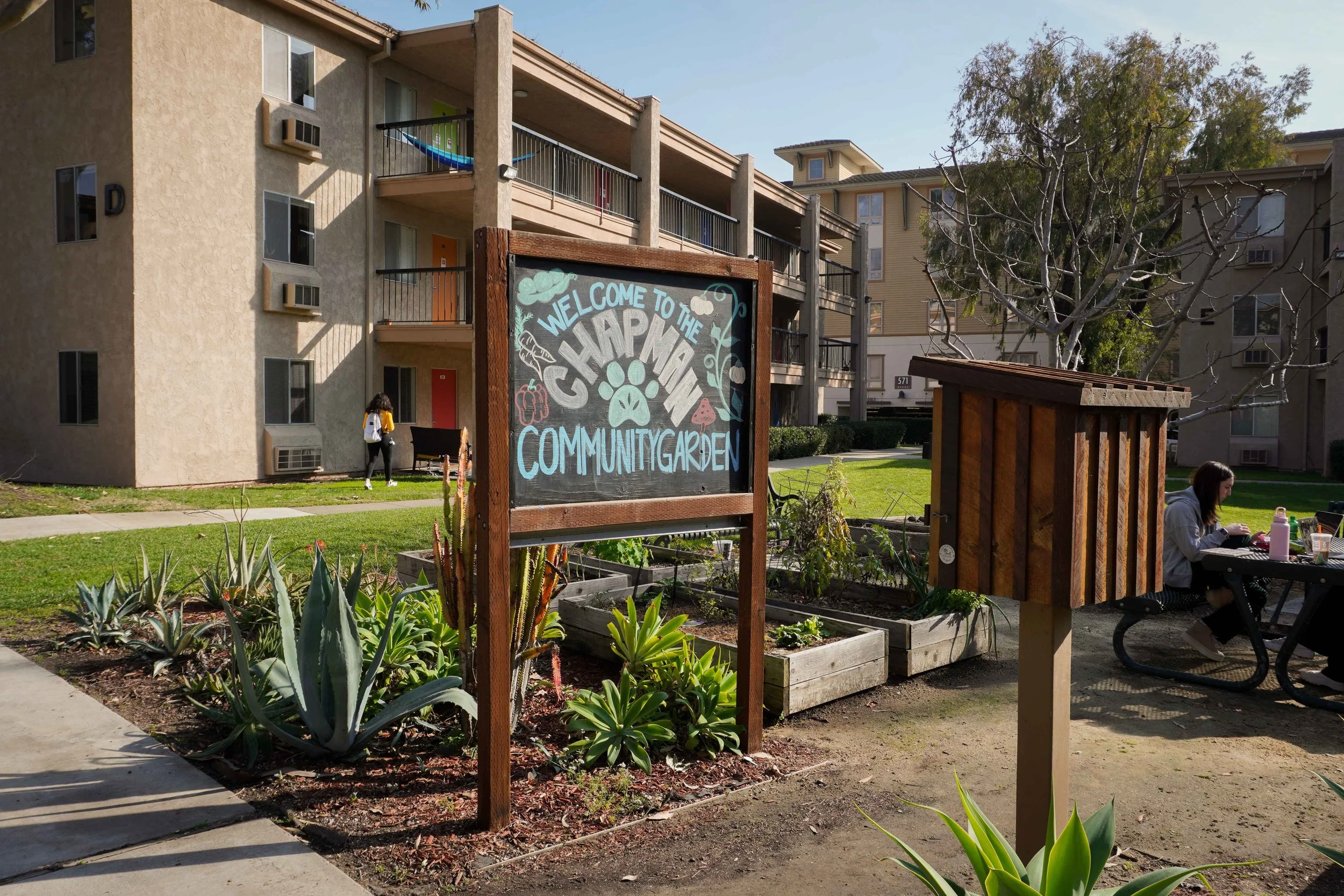Chapman’s Community Garden promotes sustainability, camaraderie among student gardeners
After over a decade of use, the Chapman Community Garden remains a niche, yet essential space for students at Chapman. Photo by SIMRAH AHMAD, Staff Photographer
Ripley Anderson grew up surrounded by agriculture in rural Oregon before moving to Orange, California to attend Chapman. Anderson said she frequently gardened throughout her childhood — a trend that has stayed with her in college as she remains one of the most avid users of its community garden.
“Specifically, we had many different fruit trees and bushes, from pears and apples to grapes and blackberries,” Anderson, a sophomore in public relations, advertising & entertainment marketing, said. “I didn’t really realize how attached I was to it all until I moved here for college.”
Anderson is just one of several students using the community garden. Chapman University’s Community Garden, located at the Davis Quad, offers a space for maintaining garden beds and involving oneself with the natural environment around them.
First opened in 2013, the Chapman Community Garden was the result of donations from 16 Chapman departments and the planning of several faculty members, students and other staff. Ever since its opening, the garden has served as a space to be shared among the Chapman community and has largely stayed the same aside from its management transitioning from the Office of Student Engagement to the Office of Sustainability in 2022.
The Office of Sustainability is largely concerned with environmental awareness on campus, such as energy, water conservation, waste and transportation. Chapman Sustainability staff currently provide those who use the community garden with tools, soil and gardening guides, depending on the seasons when the beds are in use.
“There is often a misconception that you have to have years of gardening experience under your belt to reserve a garden bed, and this is not the case. We aim to reduce that barrier to entry by providing gardening guides with seasonal suggestions of what to grow and how to care for your plants (and) giving gardeners access to tools and potting soil, (as well as) helping troubleshoot any issues gardeners are having with their beds.”
The on-campus garden is open to students with any level of experience; whether they’re starting out planting beds themselves or if they’re experienced in caring for their own plants. Opportunities to sign up for a bed can be found through Chapman Sustainability’s Instagram page, where up to six students can reserve a single bed. Students who want to keep using a bed at the end of a semester during school-sanctioned breaks can . Chapman Sustainability staff members also send out forms to students who want to keep using a bed at the end of a semester during school-sanctioned breaks.
However, the garden is more than just a way for students to learn more about growing plants and connecting with nature. Kaufman stated that they hope to expand the garden in the future and set up specific beds to demonstrate ways to conserve water when gardening and create meals with zero waste from the plants.
“A trend that’s been great to see developing is the gardeners really finding a sense of community amongst themselves. They have a group chat where they share seeds, stem cuttings, plants and offer to water other gardeners’ beds. They’re learning from each other and helping each other to grow thriving garden beds.”
Anderson was drawn to the garden during her first semester at Chapman when she started growing green onions to use in her own cooking due to their fast growth speed. She also noted that the weather in California allowed her to grow a large number of different plants, ranging from carrots and kale to lettuce and cucumbers.
“One of my favorite things about the garden is the fruit trees surrounding it. There’s a pomegranate, fig and lime tree. I’ve been harvesting fruit from the lime tree for months to use in my cooking and to also make limeade. I only actually noticed (the lime tree) a few months into having my garden bed. Most people at Chapman — even those who live at Davis — don’t even know it exists. There’s also a cute little patch of mint growing on the side of the garden.”
While Anderson had a few bumpy patches with the garden in the past, such as when her bed was accidentally covered in a foot of dirt due to a mix-up with unreserved beds, her experience with the community garden has been largely positive overall.
To combat any problems student gardeners face, Chapman Sustainability has taken steps to fix some flaws of the garden, including an unreliable faucet and hose that Anderson said have recently been replaced after the issue was brought to the department’s attention.
Anderson believes that more students on campus should give gardening a chance.
“If you are thinking about reserving a garden bed, I highly recommend it! Not only does it give you a chance to save a little money by growing your own food, but it also makes you feel more accomplished,” Anderson said. “There’s something special about being the reason a plant grows and thrives. Overall, I feel like I’m a happier and prouder person with my garden bed.”
“If you are thinking about reserving a garden bed, I highly recommend it! Not only does it give you a chance to save a little money by growing your own food, but it also makes you feel more accomplished. There’s something special about being the reason a plant grows and thrives. Overall, I feel like I’m a happier and prouder person with my garden bed.”

